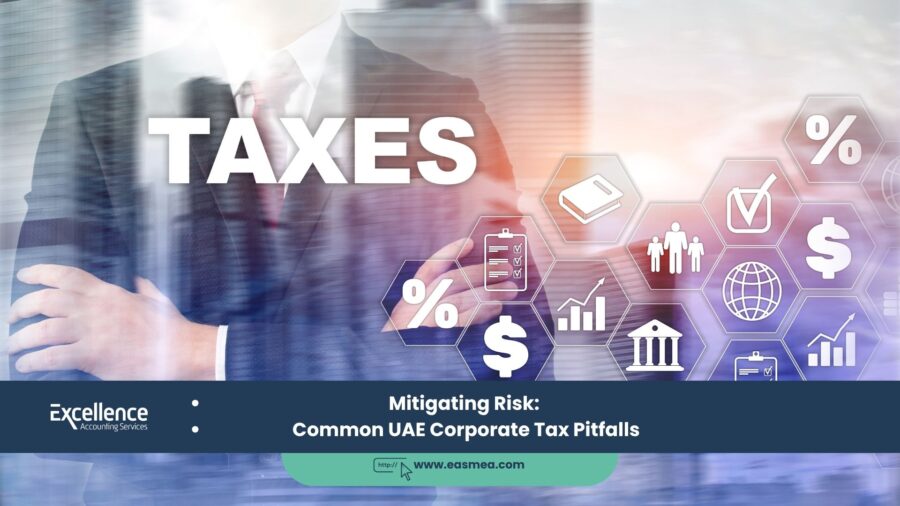Mitigating Risk: Common UAE Corporate Tax Pitfalls & How to Avoid Them
The introduction of Corporate Tax in the UAE marked a monumental shift in the nation’s business landscape. While it aligns the UAE with global economic standards and creates a sustainable revenue stream for public services, it also presents a new layer of complexity and risk for businesses. Navigating this new regime is not merely about paying a 9% tax; it’s about fundamentally re-engineering financial processes to ensure compliance, accuracy, and efficiency.
- Mitigating Risk: Common UAE Corporate Tax Pitfalls & How to Avoid Them
- Pitfall 1: Inadequate Financial Record-Keeping
- Pitfall 2: Miscalculating Taxable Income & Disallowed Expenses
- Pitfall 3: Ignoring Transfer Pricing (TP) Regulations
- Pitfall 4: Misunderstanding the Free Zone Regime
- What Excellence Accounting Services (EAS) Can Offer
- Frequently Asked Questions (FAQs)
- Don't Navigate Corporate Tax Alone.
For many companies, the transition is fraught with potential missteps. From inadequate record-keeping and misinterpretation of complex regulations to the nuanced rules governing Free Zones and international transactions, the pitfalls are numerous. A single error, whether intentional or accidental, can lead to significant financial penalties, reputational damage, and intense scrutiny from the Federal Tax Authority (FTA). Proactive risk mitigation is no longer an option—it is a core business necessity.
This comprehensive guide delves deep into the most common UAE Corporate Tax pitfalls that businesses face. We will dissect each challenge, providing clear explanations, practical examples, and actionable strategies to safeguard your organization. This is not just a checklist; it’s a strategic framework for building a tax-resilient business foundation, ensuring you not only comply with the law but also optimize your financial health in this new era.
Key Takeaways
- Impeccable Record-Keeping is Non-Negotiable: The foundation of all tax compliance is accurate, complete, and timely financial records. This is the first line of defense against audits and penalties.
- Understand Taxable Income Nuances: Calculating taxable income is not the same as calculating accounting profit. Knowing what is deductible and what is not is critical.
- Transfer Pricing is Under Scrutiny: Transactions with related parties must be at “arm’s length.” Incorrect pricing can lead to significant tax adjustments and penalties.
- Free Zone Status is Not a Blanket Exemption: “Qualifying Income” rules are complex. Free Zone entities must meticulously segregate income sources to benefit from the 0% rate.
- Deadlines are Strict: Failure to register for Corporate Tax or file returns on time will result in automatic penalties. Procrastination is a costly mistake.
- Audited Financials are Often Required: Many businesses, especially in Free Zones, will need audited financial statements. Preparing for this in advance is crucial.
Pitfall 1: Inadequate Financial Record-Keeping
The single most significant pitfall for businesses is the failure to maintain robust and compliant financial records. Under the Corporate Tax law, the burden of proof rests entirely on the taxpayer. Without detailed, accurate, and contemporaneous documentation, you cannot substantiate the figures on your tax return, making you vulnerable during an FTA audit.
The Challenge: Many businesses, particularly SMEs, have historically relied on informal or incomplete bookkeeping practices. The new regime demands a higher standard. Records must be maintained for at least seven years after the relevant tax period. This includes not just invoices and bank statements, but also contracts, agreements, general ledgers, trial balances, and all supporting documents that validate a transaction’s business purpose.
Mitigation Strategy:
- Implement a Robust Accounting System: Move away from spreadsheets. A professional accounting software (like Zoho Books, Xero, or QuickBooks) is essential for maintaining an audit trail. A professional accounting system implementation service can ensure your setup is compliant from day one.
- Professional Bookkeeping: Your records are only as good as the data entered. Engaging in professional accounting and bookkeeping services ensures that transactions are classified correctly and financial statements are prepared in accordance with International Financial Reporting Standards (IFRS).
- Regular Reconciliation: Don’t wait until year-end. Perform monthly bank and account reconciliations to catch errors early. This is a core component of diligent account reconciliation services.
Under the UAE Corporate Tax Law, if a transaction isn’t documented, it effectively didn’t happen for tax purposes. Your records are your only defense.
Pitfall 2: Miscalculating Taxable Income & Disallowed Expenses
A common misconception is that the “profit” shown on your income statement is the same as your “taxable income.” The UAE Corporate Tax law specifies certain types of expenses that are either fully or partially non-deductible when calculating your tax liability.
Common Non-Deductible or Partially Deductible Expenses:
- Entertainment Expenses: Only 50% of expenses related to entertaining customers, shareholders, suppliers, or other business partners are deductible. This includes meals, accommodation, and event tickets.
- Fines and Penalties: Any fines or penalties imposed by a government entity (except for compensation for breach of contract) are not deductible.
- Donations: Donations made to organizations that are not approved “Qualifying Public Benefit Entities” are not deductible.
- Interest Expenses: General interest expenses are limited to 30% of your EBITDA (Earnings Before Interest, Taxes, Depreciation, and Amortization), subject to certain conditions.
Mitigation Strategy: Your chart of accounts must be detailed enough to segregate these expenses. For instance, instead of a single “Entertainment” account, create sub-accounts like “Staff Entertainment” (fully deductible) and “Client Entertainment” (50% deductible). This level of detail is crucial for accurate financial reporting and tax calculation. A thorough accounting review can identify these misclassifications before they become a tax liability.
Pitfall 3: Ignoring Transfer Pricing (TP) Regulations
Transfer Pricing is arguably the most complex area of Corporate Tax and a major focus for tax authorities globally. It applies to all transactions between “Related Parties” or “Connected Persons.” This could be transactions between two companies under the same owner, or between a company and its owner or director.
The Core Principle: All such transactions must adhere to the “arm’s length principle.” This means the price and conditions of the transaction must be the same as they would be between two completely independent, unrelated parties. For example, if a parent company provides a loan to its subsidiary, the interest rate must be at a market-competitive rate, not 0%.
The Risk: If the FTA determines that a transaction was not at arm’s length and resulted in a lower taxable income in the UAE, they can adjust the income upwards and impose significant penalties. Businesses meeting certain revenue thresholds must maintain extensive TP documentation to prove their pricing is fair.
Mitigation Strategy:
- Identify All Related Parties: Map out your entire corporate structure and identify all individuals and entities that fall under the definition of Related Parties.
- Benchmark Transactions: For any transaction with a Related Party, document how you arrived at the price. This may involve seeking external comparable data or conducting a formal benchmarking study.
- Maintain Documentation: Prepare and maintain a TP Master File and Local File if required. For all businesses, it’s prudent to have a clear, written TP policy. This is where expert UAE corporate tax advisory is invaluable.
Pitfall 4: Misunderstanding the Free Zone Regime
Many businesses were established in UAE Free Zones due to the promise of a 0% tax environment. While the new Corporate Tax regime preserves this benefit, it is not automatic and is subject to strict conditions.
The “Qualifying Free Zone Person” (QFZP) Status: To be eligible for the 0% rate, a Free Zone entity must meet several conditions, including maintaining adequate “substance” (employees, assets, operations) within the Free Zone and passing an annual audit.
“Qualifying Income” vs. Taxable Income: The 0% rate only applies to “Qualifying Income.” This generally includes income from transactions with other Free Zone businesses or from exporting goods/services outside the UAE. Income from most transactions with Mainland UAE customers is subject to the standard 9% tax rate (with some exceptions). Furthermore, any income that is not “Qualifying Income” can disqualify *all* of the entity’s income from the 0% rate for that year and the subsequent four years.
Mitigation Strategy:
- Segregate Income Streams: Your accounting system must be able to clearly track and separate Qualifying Income from income subject to the 9% tax.
- Conduct a Substance Review: Ensure your level of activity within the Free Zone is sufficient to justify your operations. This is a key focus of business consultancy.
- Mandatory Audits: Plan for an annual audit. Engage a reputable firm for external audit services well in advance of your filing deadline.
What Excellence Accounting Services (EAS) Can Offer
Navigating the complexities of UAE Corporate Tax requires specialized expertise. At EAS, we provide a comprehensive suite of services designed to mitigate your risks and ensure full compliance.
- End-to-End Corporate Tax Services: From registration and impact assessment to return filing and strategic advisory, our UAE Corporate Tax services cover every aspect of your compliance journey.
- Foundational Accounting and Bookkeeping: We ensure your financial records are impeccable, providing the solid foundation needed for accurate tax reporting through our accounting and bookkeeping services.
- Strategic Financial Leadership: Our CFO services provide high-level tax planning, helping you structure your business for optimal tax efficiency.
- Audit & Assurance: Whether you need a proactive internal audit to test your controls or a mandatory external audit for regulatory purposes, our experts ensure your financials are robust and credible.
- Efficient Financial Operations: We streamline your finances with specialized services for accounts payable, accounts receivable, and comprehensive payroll management, ensuring all data is accurate for tax purposes.
- Business Structuring & Advisory: From initial company formation to ongoing business consultancy, we help you build a compliant and tax-efficient corporate structure. We also provide critical insights through feasibility studies and due diligence for major business decisions.
Frequently Asked Questions (FAQs)
The most common mistakes include: 1) Commingling business and personal expenses, making it impossible to justify deductions. 2) Failing to keep supporting documentation beyond just an invoice, such as contracts or proof of service delivery. 3) Using generic expense categories in their accounting software, which fails to segregate partially deductible items like client entertainment. 4) Inconsistent recording of transactions, leading to reconciliation nightmares at year-end. 5) Not maintaining records for the mandatory seven-year period.
No. The law is very specific. Only 50% of legitimate business entertainment expenses are deductible. This applies to costs for entertaining clients, customers, shareholders, or suppliers. Importantly, expenses for entertaining employees (e.g., a staff party or team lunch) are generally 100% deductible as they are considered a staff welfare cost, not business entertainment. Your accounting system must clearly distinguish between these two categories.
Absolutely not. This is a dangerous assumption. You are only eligible for the 0% rate on “Qualifying Income,” and only if you meet all the conditions to be a “Qualifying Free Zone Person” (QFZP). This includes maintaining adequate substance and having audited financial statements. Any income from a Mainland UAE source, or income that fails to meet the ‘de minimis’ requirements, could subject your *entire* income to the 9% tax, not just the non-qualifying part.
A “Related Party” is an individual or entity with a pre-existing relationship with your business, typically through ownership or control. This includes the business owner, their close relatives (spouse, children, parents), other companies owned by the same person, or a parent/subsidiary company. Transactions are critical because they can be used to shift profits to lower-tax jurisdictions or entities. The law requires all such transactions to be priced at “arm’s length”—as if they were between strangers—to prevent tax avoidance. The FTA heavily scrutinizes these transactions.
The penalty for failing to register for Corporate Tax within the specified timeframe is AED 10,000. This is an administrative penalty that is applied automatically. Missing the deadline not only results in a fine but also signals to the FTA that your business may have poor compliance controls, potentially increasing your chances of being selected for an audit in the future.
Not for every company, but it is for many. It is mandatory for any Free Zone entity wishing to be treated as a Qualifying Free Zone Person. It is also mandatory for any Mainland company with revenue exceeding AED 50 million in a tax period. Even if not mandatory, the FTA can request audited financial statements from any taxpayer at any time. Therefore, having them prepared is a best practice that adds significant credibility to your tax return.
A UAE company is generally taxed on its worldwide income. However, you can make an irrevocable election to claim an exemption for income from a “Foreign Permanent Establishment” (like an overseas branch) if that income has been subject to a corporate tax of at least 9% in the foreign country. This prevents double taxation. Alternatively, if no exemption is claimed, you can claim a “Foreign Tax Credit” for the taxes paid abroad against your UAE tax liability.
Small Business Relief is a provision to support startups and small businesses. If a resident taxable person’s revenue in the relevant tax period (and previous tax periods) is below AED 3 million, they can elect to be treated as having no taxable income for that period. This means they do not have to pay any tax. However, they must still register for Corporate Tax and file a tax return. It’s an election, not an automatic exemption.
You can only deduct bad debts under specific conditions. You cannot deduct a general provision (e.g., “I estimate 2% of my receivables will go bad”). You can only claim a deduction for a specific debt if: 1) You have written it off in your accounting records, and 2) you have taken all reasonable steps to collect the debt and have evidence to prove it (e.g., legal notices, collection agency reports). Simply having an old receivable is not sufficient for a tax deduction.
Interest expenses incurred for a valid business purpose are generally deductible. However, there are two key limitations. First, the general interest deduction is capped at 30% of your business’s EBITDA. Second, if the loan is from a Related Party, the interest rate must be at an arm’s length rate. If the rate is found to be excessively high, the FTA can disallow the excess portion of the interest as a deductible expense. Proper documentation justifying the loan’s purpose and the interest rate is crucial.
Conclusion: Proactive Strategy is the Best Defense
The introduction of UAE Corporate Tax requires a paradigm shift from reactive compliance to proactive risk management. The pitfalls discussed are not just theoretical risks; they are practical challenges that businesses are facing today. Waiting for an FTA audit to discover a flaw in your processes is a strategy destined for failure.
By investing in a robust accounting infrastructure, seeking expert guidance on complex areas like transfer pricing and Free Zone regulations, and fostering a culture of diligent documentation, you can turn a compliance burden into a strategic advantage. A strong tax position enhances financial transparency, builds investor confidence, and ultimately protects your bottom line. The time to act is now.




